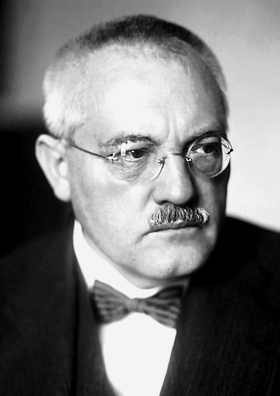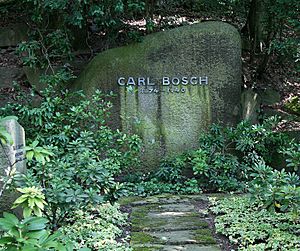Carl Bosch facts for kids
Quick facts for kids
Carl Bosch
|
|
|---|---|
 |
|
| Born | 27 August 1874 |
| Died | 26 April 1940 (aged 65) Heidelberg, Germany
|
| Nationality | German |
| Alma mater | Technical University of Berlin |
| Known for | Haber–Bosch process |
| Awards |
|
| Scientific career | |
| Fields | Chemistry |
| Institutions | BASF, IG Farben |
| Doctoral advisor | Johannes Wislicenus |
| Signature | |
 |
|
Carl Bosch (born August 27, 1874 – died April 26, 1940) was a German chemist and engineer. He won the Nobel Prize in Chemistry. Carl Bosch was a leader in using high pressure for industrial chemistry. He also helped start IG Farben, which became one of the biggest chemical companies in the world.
Contents
Carl Bosch's Life and Work
Early Life and Education
Carl Bosch was born in Cologne, Germany. His family was successful; his father supplied gas and plumbing. His uncle, Robert Bosch, was famous for inventing the spark plug.
Carl was interested in both working with metals and chemistry. He studied at the Technical University of Berlin and the University of Leipzig from 1892 to 1898.
Starting His Career
In 1898, Carl Bosch earned his doctorate degree in organic chemistry from the University of Leipzig. His teacher there was Johannes Wislicenus.
In 1899, he began working at BASF. At that time, BASF was Germany's largest company for chemicals and dyes.
The Haber–Bosch Process
From 1909 to 1913, Carl Bosch worked on a very important project. He took an idea from Fritz Haber and made it work on a large scale. This idea was a way to "fix" nitrogen from the air.
This process is now called the Haber–Bosch process. It uses high pressure to create synthetic nitrate. This chemical is used to make many different industrial products and consumer goods.
Carl Bosch's main achievement was making this process big enough for factories. He had to design and build special equipment. This equipment could work safely under very high gas pressures and temperatures.
With this new method, they could make huge amounts of ammonia. Ammonia is important for both industry and farming. This invention helped increase how much food farms could grow around the world.
Later Achievements
After World War I, Bosch used his high-pressure methods for other things. He helped create ways to make synthetic fuel and methanol.
In 1925, Carl Bosch helped create IG Farben. He became its first head. By 1935, he was the chairman of the board of directors.
In 1931, Carl Bosch won the Nobel Prize in Chemistry. He shared it with Friedrich Bergius. They won for their work on high-pressure chemistry. Today, the Haber–Bosch process makes 100 million tons of nitrogen fertilizer every year.
Personal Life and Legacy
Carl Bosch did not agree with many of the Nazi government's ideas. After Hitler became chancellor, Bosch gradually lost his important positions. He became very sad. He passed away in Heidelberg.
Carl Bosch's work, especially the Haber–Bosch Process, is still very important today. This process uses a lot of energy, but it helps feed about one-third of the world's population. About half of the nitrogen in a human body comes from chemicals made by the Haber–Bosch process.
Carl Bosch loved collecting things. He had large collections of insects, minerals, and gems. His collection of meteorites and other minerals was later bought by the Smithsonian museum.
Many experts consider Carl Bosch and Fritz Haber to be among the most important chemical engineers ever. The Haber–Bosch process captures nitrogen from the air and turns it into ammonia. This process was a key part of the Green Revolution, which helped feed the world's growing population.
Awards and Honours
Carl Bosch received many awards for his important work:
- 1919: Liebig Medal
- 1924: Werner von Siemens Ring
- 1931: Nobel Prize in Chemistry
- 1932: Wilhelm Exner Medal
- Bunsen Medal
- Golden Grashof Memorial medal
- Carl Lueg Memorial Medal
Images for kids
See also
 In Spanish: Carl Bosch para niños
In Spanish: Carl Bosch para niños
 | Valerie Thomas |
 | Frederick McKinley Jones |
 | George Edward Alcorn Jr. |
 | Thomas Mensah |



